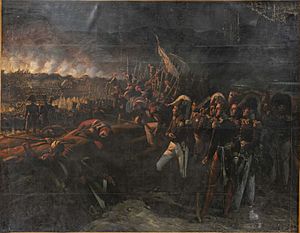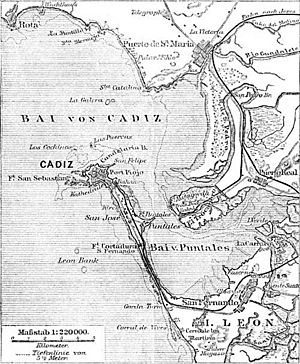Battle of Trocadero facts for kids
Quick facts for kids Battle of Trocadero |
|||||||
|---|---|---|---|---|---|---|---|
| Part of the Spanish Expedition | |||||||
 French nocturnal decisive assault on Fort Trocadero, on the night of 30 and the day of 31 August 1823 (by P. Delaroche, Chateau de Versailles) |
|||||||
|
|||||||
| Belligerents | |||||||
| Commanders and leaders | |||||||
| Strength | |||||||
| 30,000 soldiers | 1,700 soldiers | ||||||
| Casualties and losses | |||||||
| 31 dead 110 wounded |
150 dead 300 wounded 1,000 captured |
||||||
The Battle of Trocadero happened on August 31, 1823. It was the most important fight during France's trip to Spain. France had sent an army to help King Ferdinand VII. The French army won against Spanish groups who wanted a more liberal government. This victory helped King Ferdinand get his full power back.
Contents
Why the Battle Happened
After Napoleon lost power, King Ferdinand VII of Spain didn't want to follow the Spanish Constitution of 1812. This constitution gave more rights to people and limited the king's power. In 1820, a rebellion started in Spain. People wanted a constitutional monarchy, where the king's power would be shared with a parliament. This rebellion was led by Rafael del Riego y Nuñez.
The King was captured and held in Cádiz, which was where the Spanish parliament, called the Cortes, met. Other powerful European countries were worried about these events. In October 1822, they met at the Congress of Verona. They decided to let France send soldiers to Spain to help King Ferdinand get his rule back. Only Britain did not agree with this decision.
French Army Arrives in Spain
On April 17, 1823, French soldiers entered Spain. They were led by Louis-Antoine, Duke of Angoulême. He was the son of the future King Charles X. The French army crossed the Pyrenees mountains to get into Spain.
Many people in Spain, especially in the Basque region and those who supported the king, welcomed the French soldiers. The Duke sent some soldiers to surround the city of San Sebastián. He then led the main attack towards Madrid, which was controlled by the rebel government. On May 23, the rebel government left Madrid and moved to Seville.
Madrid's military leader secretly gave up and ran away to France. Without a leader, the soldiers in Madrid couldn't stop the French. The French army took control of Madrid. They put a temporary ruler in charge until King Ferdinand could return.
Taking Fort Trocadero
The French army then moved south to deal with the rebels in Cádiz. They surrounded the fort of Trocadero. This fort controlled the way into Cádiz city. On August 31, 1823, the French launched a surprise attack. They attacked from the sea side when the tide was low, using bayonets. They quickly took the fort.
After taking the fort, French soldiers captured the nearby Trocadero village. They attacked from the side, surprising the Spanish defenders. In total, 1,700 Spanish soldiers were captured by the French.
Cádiz itself kept fighting for three more weeks, even though the French were bombing it. But on September 23, 1823, Cádiz had to give up. King Ferdinand was set free and given back to the French. The king had promised to forgive the rebels, but he did not keep his promise. Many people faced harsh punishments after he returned to power.
What Happened Next
The Battle of Trocadero was one of the reasons why U.S. President James Monroe made an important statement. On December 2, 1823, he announced what became known as the Monroe Doctrine. This policy aimed to protect the Americas from European countries trying to control them.
The fall of Trocadero was remembered in Paris, France. A large area in Paris, where the city was growing, was named Trocadéro. Louis-Antoine, Duke of Angoulême, who won the battle, was offered the title "Prince of Trocadero" by the Spanish king. However, he refused the title. He was upset that King Ferdinand had broken his promises to be kind to the rebels.
The famous writer Victor Hugo wrote about the battle in his book Les Misérables. He called it "a fine military action." But he also said that the war was "an outrage on the generous Spanish nation." He felt it was also "an outrage on the French Revolution."
See also
 In Spanish: Batalla de Trocadero para niños
In Spanish: Batalla de Trocadero para niños
 | Sharif Bey |
 | Hale Woodruff |
 | Richmond Barthé |
 | Purvis Young |


